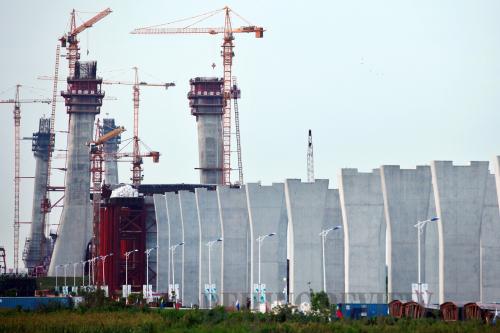Calming Local Debt Fears
 0 Comment(s)
0 Comment(s) Print
Print E-mail
Beijing Review, September 5, 2011
E-mail
Beijing Review, September 5, 2011
|
|
|
New bridge, new debt: The second bridge over the Yangtze River in Jiujiang, Jiangxi Province is under construction. A large share of local government debt has been used in infrastructure projects [Hong Xianzhi/Beijing Review] |
Editor's notes:Local governments in China, barred from directly selling bonds and taking out bank loans, have set up thousands of financing vehicles to raise money to fund infrastructure projects. A first-ever audit found that these local government financing vehicles have accumulated a record breaking debt of 10.7 trillion yuan ($1.7 trillion). But there's no need to panic over this debt, said Xu Lin, Director of the Department of Fiscal and Financial Affairs of the National Development and Reform Commission (NDRC), in a question-and-answer statement posted on the NDRC's website on August 29. Edited excerpts follow:
With sovereign debt crises worsening in the West, worries about China's mounting local government debt and its risks are rising. What do you think about the government's borrowing behavior and debt risks?
Xu Lin: China has learned a valuable lesson from the current sovereign debt crises in the West. It is imperative to adopt measures to strengthen administration of government and guard against risks. An important point in appraising the risks of China's local government debt is that the debt is different from that in the United States and the EU.
The capital raised from issuing bonds to the public by local government financing vehicles is largely used in infrastructure projects, which can boost local economic and social development. But it does not mean that local governments can borrow without remorse. What's the most important is we should get the scale of investment and debt under control.
The State Council has been attaching importance to the risks of local government debt. It ordered relevant departments to investigate and research on this issue as early as the second half of 2009 and issued documents on regulating the management and borrowing of local government financing vehicles. The National Audit Office, after a strict nationwide survey of provincial and municipal government debt, said that risks of China's local government debt are generally controllable given its solvency.
If debt owed by the Central Government is included, the total debt is still less than 50 percent of the country's GDP, much lower than the debt-laden EU countries and the United States. Given the fact that China is witnessing rapid economic growth and increasing fiscal revenue and the amount of realizable assets held by local governments is quite large, the governments' ability to repay its debt is sound.
In addition, local governments and supervisory departments have introduced risk-reducing measures against local government debt. In this sense, the likelihood that local governments will default on their debts is low.
Recently, it became difficult for local government financing vehicles to issue bonds and the interest rates were quite high. What do you think of this phenomenon?
Investors began to doubt the repayment ability of bonds issued to the public via local government financing vehicles, also called quasi-municipal bonds, out of the concerns about risks of local government debt. I think it's a natural reaction of mature investors.
It's highly unlikely that our local governments will default on their debts. It is unnecessary to panic or even go short on those bonds based on unreasonable judgments.
The increased difficulty in selling quasi-municipal bonds is the result of two major factors.
First, China's monetary policy changed from moderately loose to prudent with the reserve requirement ratio and benchmark interest rates being increased several times. Almost all bonds now have a higher interest rate than before.
Second, investors' worries about local government debt risks have made the risk premium in issuing bonds higher than before. A higher interest rate means higher profits for investors and is not necessarily bad news for bond investors. I don't agree that quasi-municipal bonds are riskier than other types of bonds. Quasi-municipal bonds require strict and transparent conditions for bond issuance.






